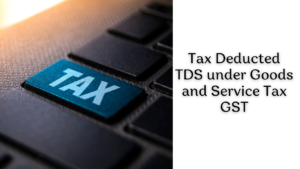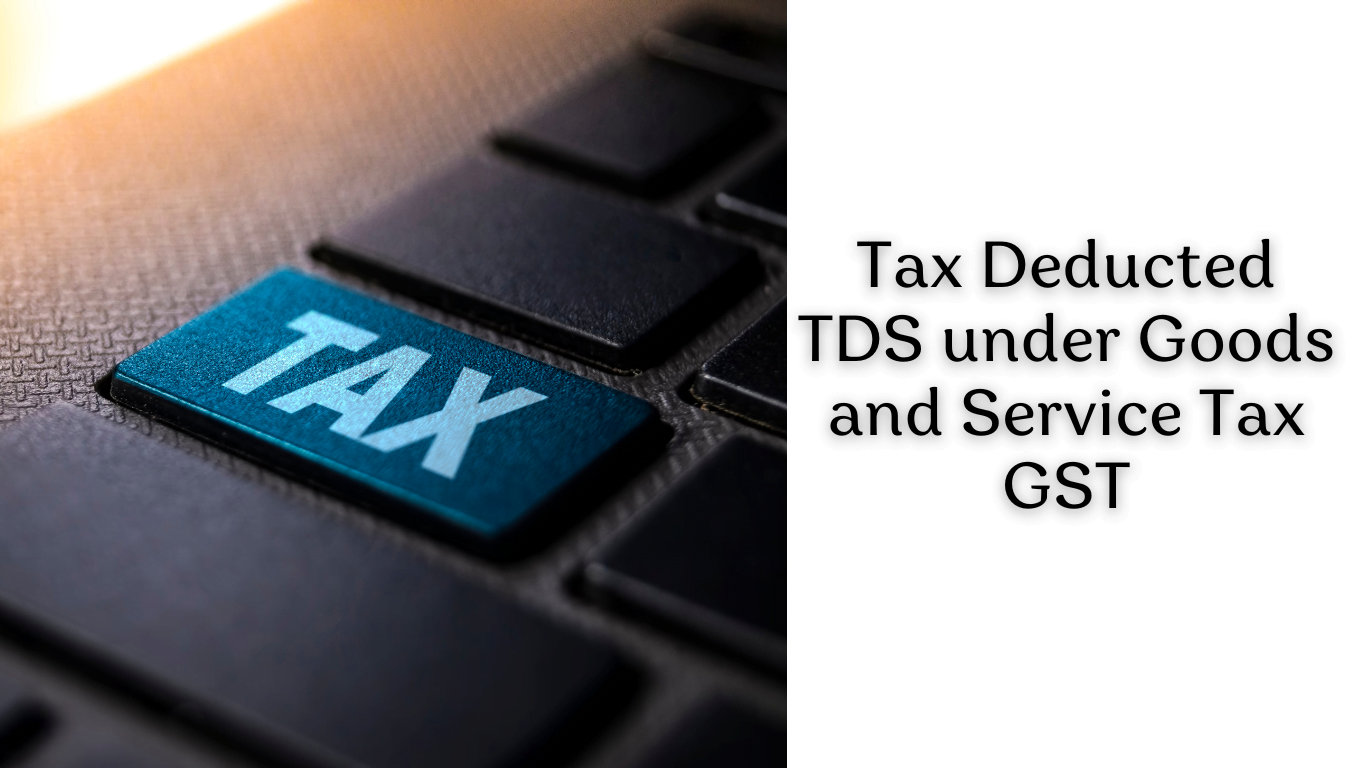Tax Deducted TDS under Goods and Service Tax GST
Tax Deducted(TDS) under Goods and Service Tax (GST) of tax compliance under the Goods and Services Tax (GST) regime. It requires certain notified persons to deduct tax at a specified rate before making payments to suppliers of taxable goods and/or services. In this article, we delve into all aspects of TDS under GST, including the TDS rate, deduction limit, applicability, filing requirements, and consequences of non-compliance.
TDS Rate under GST:
Tax Deducted TDS under Goods and Service Tax GST TDS under GST is required to be deducted at the rate of 2% on payments made to the supplier of taxable goods and/or services. This rate is fixed and applies uniformly across all transactions subject to TDS provisions.
Deduction Limit:
Tax Deducted TDS under Goods and Service Tax GST There is no minimum threshold for TDS deduction under GST. Regardless of the amount of payment made, if the transaction falls within the scope of TDS provisions, tax must be deducted at the prescribed rate.
Applicability:
TDS under GST applies to certain notified persons, including government departments, local authorities, and specific categories of taxpayers as prescribed by the GST laws. It is crucial for these entities to identify their obligations regarding TDS and ensure compliance with the provisions.
Forms to be Filed:
Tax Deducted TDS under Goods and Service Tax GST Entities liable to deduct TDS under GST are required to obtain a Tax Deduction and Collection Account Number (TAN) and file TDS returns using Form GSTR-7. This form must be filed on a monthly basis, providing details of TDS deducted and deposited during the relevant period.
Interest and Penalties:
Tax Deducted TDS under Goods and Service Tax GST Non-compliance with TDS provisions under GST may attract interest and penalties as per the applicable provisions of the GST laws. It is essential for notified persons to fulfil their TDS obligations timely and accurately to avoid any adverse consequences.
Liability to Deduct TDS under GST and TDS Rate
Under the Goods and Services Tax (GST) regime, Tax Deducted at Source (TDS) is to be deducted at a rate of 2% on payments made to the supplier of taxable goods and/or services. However, this deduction applies only when the total value of such supply, under an individual contract, exceeds Rs.2,50,000.
Key Points:
- TDS Rate: The TDS rate under GST is fixed at 2% of the payment made to the supplier for taxable goods and/or services.
- Threshold Limit: TDS is applicable when the total value of supply under a single contract exceeds Rs.2,50,000. If the total value does not reach this threshold, TDS deduction is not required.
- Location Criteria: No deduction of TDS is necessary when the location of the supplier and the place of supply is different from the state of registration of the recipient. This exemption applies to prevent unnecessary burden on transactions involving interstate supplies.
Registration Requirements for TDS Deductors:
Any entity liable to deduct TDS under the GST regime must register compulsorily, without any threshold limit. Registration under GST can be obtained using the existing Tax Deduction and Collection Account Number (TAN) issued under the Income Tax Act. Therefore, possession of a TAN is mandatory for TDS deductors.
Payment of TDS:
TDS must be paid within 10 days from the end of the month in which the tax is deducted. The payment should be made using Form GSTR-7 and remitted to the appropriate government authority, depending on the type of GST:
- The Central Government for IGST and CGST.
- The State government for SGST.
Provisions for TDS Certificates:
Tax Deducted TDS under Goods and Service Tax GST Similar to the Income Tax Law, the entity deducting tax under GST is required to issue a TDS certificate in Form GSTR-7A to the concerned person within 5 days of depositing the tax with the government. The GST portal automatically generates and provides GSTR-7A to the deductee based on the information furnished in the filed GSTR-7. This ensures transparency and compliance with TDS provisions under the GST law.
Calculation of Value of Supply for TDS Deduction:
Tax Deducted TDS under Goods and Service Tax GST In the context of deducting Tax Deducted at Source (TDS) under GST, the value of supply is determined by considering the amount excluding the tax indicated on the invoice. This implies that TDS is not applicable on the CGST, SGST, or IGST component of the invoice.
Example:
Let’s consider an example where Supplier A makes a supply worth Rs.5,000 to Recipient B at a GST rate of 18%. When B pays A, the total amount payable is calculated as follows:
- Worth of Supply: Rs.5,000
- GST (18% of Rs.5,000): Rs.900
Therefore, the total payment made by B to A is Rs.5,000 (for the worth of supply) plus Rs.900 (GST). However, TDS is deducted only on the worth of the supply, which is Rs.5,000, and not on the GST component.
Which form is required to file the TDS return?
The person responsible for deducting tax at source (TDS) is required to file a TDS return using Form GSTR-7. This return must be filed within 10 days from the end of the month in which the tax has been deducted. Filing the return in a timely manner ensures compliance with the GST regulations and facilitates smooth administration of the tax deduction process.
What is the benefit of TDS to the deductee (Supplier)?
As mentioned earlier, once the deductor files their returns, there will be an automatic update in the electronic ledger of the deductee (supplier). The deductee can then claim credit in their electronic cash ledger for the tax amount deducted. This credit can be utilised for making payments towards other taxes, facilitating ease of compliance and ensuring seamless tax management for both parties involved.

Penalties for not complying with TDS provisions under GST
Below are the penalties applicable for non-compliance with GST TDS provisions:
- TDS Not Deducted:
- Penalty: Interest is payable at 18% along with the TDS amount. Alternatively, the amount may be determined and recovered as per the provisions of the law.
- Delay in TDS Certificate Issuance:
- Penalty: A late fee of Rs.100 per day will be charged for each day of delay, subject to a maximum of Rs.5000, under each Act if the TDS certificate has not been issued or is delayed beyond 5 days.
- TDS Deducted But Not Paid to Government:
- Penalty: Interest is payable at 18% along with the TDS amount, calculated from the next day of the return filing deadline until the actual date of payment. Alternatively, the amount may be determined and recovered as per the provisions of the law if TDS is deducted but not paid to the government or paid after the 10th of the following month.
- Late Filing of TDS Return:
- Penalty: A late fee of Rs.100 per day of delay will be charged, subject to a maximum of Rs.5000, under each Act for late filing of the TDS return.
These penalties underscore the importance of adhering to the TDS provisions under GST and filing returns in a timely manner to avoid financial repercussions and ensure compliance with tax regulations.
Procedure for Obtaining TDS Refund under GST
If an excess amount is deducted and paid to the government, a refund can be claimed, as this amount does not rightfully belong to the government. However, if the deducted amount has already been added to the electronic cash ledger of the supplier, the deductor cannot claim a refund for that amount.
Key Points to Note:
- Excess Deduction: If an amount exceeding the required TDS is deducted and paid to the government, the deductor can claim a refund for the excess amount.
- Refund Claim Process: The deductor can initiate the refund claim process through the appropriate channels as per the provisions of the GST law.
- Electronic Cash Ledger: If the excess TDS amount has already been added to the electronic cash ledger of the supplier (deductee), the deductor cannot reclaim this amount as a refund. The deductee may be able to claim a refund of the excess tax, subject to the refund provisions of the GST Act.
- Compliance: Tax Deducted(TDS) under Goods and Service Tax (GST) It is crucial for both deductors and deductees to ensure compliance with TDS provisions and refund procedures under the GST regime to avoid any discrepancies and facilitate smooth transactions.
Tax Deducted(TDS) under Goods and Service Tax (GST) By adhering to the refund provisions of the GST Act and maintaining accurate records, businesses can effectively manage their TDS obligations and ensure timely refunds for any excess amounts deducted.
Conclusion:
TDS under GST is a mechanism aimed at ensuring tax compliance and revenue collection while streamlining the indirect tax system. By deducting tax at the source, the government aims to prevent tax evasion and promote transparency in business transactions. Tax Deducted(TDS) under Goods and Service Tax (GST) It is imperative for notified persons to understand their obligations regarding TDS under GST and fulfil them diligently to avoid any legal repercussions. Compliance with TDS provisions not only contributes to the smooth functioning of the GST regime but also fosters trust and credibility in the tax system.
FOR MORE INFORMATION: https://taxgyany.com/

